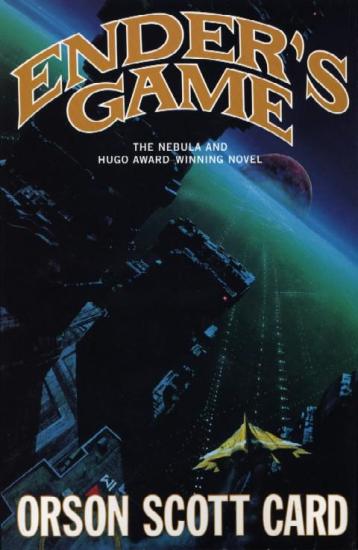
Series: Book 1 in the The Ender Saga series
Rating: *****
Tags: Fantasy, Science Fiction, Lang:en
Summary
Ender's Game Nebula and Hugo Award
Winner
--------------------------------------------------------------------------------
From its first publication in January 1985, Ender's Game
quickly became a classic in the science fiction field. It was
greeted enthusiastically by the Science Fiction Writers of
America, which gave it the Nebula Award for best novel of 1985,
and the 1986 World Science Fiction Convention awarded Ender's
Game the best novel Hugo. (What really stunned everyone was the
following year, when the sequel, Speaker for the Dead, also won
both awards -- something no author had ever done before, still
less for a book and its sequel!) While Card has gone on to win
other awards (two more Hugos, a World Fantasy Award, and in
1996 the Locus Award for Best Fantasy Novel of the year for his
book Alvin Journeyman), Ender's Game continues to be his most
popular novel, capturing the imagination of children,
teenagers, and adults. Ender's Game has been translated into
French, German, Spanish, Japanese, Dutch, Czech, Danish,
Finnish, Hebrew, Hungarian, Italian, Polish, Portuguese,
Romanian, Russian, and Swedish. Why does the story work so
well? Many people call it "the science fiction novel for people
who don't think they like science fiction." While the trappings
of science fiction are there -- spaceships, aliens, futuristic
machinery -- the reason the book works for so many people is
that it's first and foremost a human story, of a boy who finds
the burdens of the world placed on his back. Isolated and
alone, his anguish resonates in the hearts of all readers. Yes,
kids who read the book really enjoy the whole idea of the
Battle School, a three-dimensional playspace where children in
special suits have mock combats between armies. Others are
intrigued by the military aspects of the book. When the Marine
University at Quantico required students in one class to read
Ender's Game, it wasn't for the strategy -- tactics in 3D space
aren't really a big deal for the Marines. Rather, it was
because Ender's Game is virtually a textbook in how to develop
a strong relationship between a commander and his troops --
with plenty of examples also in how to fail as a commander.
Other people -- especially in the online community -- love
Ender's Game because of the powerful role it shows for computer
networks in the world of the future. The Internet has taken a
few steps in the direction shown by Ender's Game, but we're
still a long way from a time when public discourse takes place
primarily on the Internet and e-discussions can influence
public policy. So Ender's Game is still a dream. Yet others
find the "Mind Game" most appealing. This is the computer game
that students in the Battle School play, allowing their
teachers to evaluate their emotional state. Ender, however,
forces the computer to reprogram itself to allow him to play
the game in new, unpredictable ways. The whole idea of a
self-altering game that responds to the needs and desires of
the player still intrigues many -- though Card has still not
been able to persuade any computer game publishers to develop a
self-creating game! Above all, though, Ender's Game is the
story of growing up alone, trying to find independence when
none is allowed, trying to find meaning in a life whose meaning
has already been defined. Almost everyone has at some time felt
himself or herself to be in the same kind of no-win situation
as Ender Wiggin, and the triumph of the book is not that Ender
Wiggin "wins," but that he grows up along the way.
--------------------------------------------------------------------------------
Copyright © 1985 Orson Scott Card A Tor Book - Published
by Tom Doherty Associates, Inc. Jacket art by John Harris -
Jacket design by Carol Russo